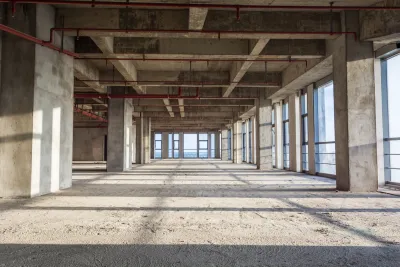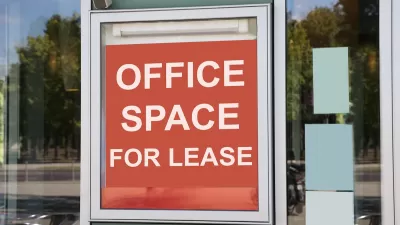Adapting office buildings to dorm-style housing with shared spaces is a much more affordable option than repurposing offices into apartments.

Could dorm-style housing be a solution to the housing crisis? Alex Horowitz, writing in Greater Greater Washington, argues that it could offer a more affordable and efficient option for converting some of Washington, D.C.’s office buildings to housing at a lower cost than full apartments. “Dorm-style housing differs from regular apartments because it’s made up of private, small units inside the building’s perimeter with shared spaces in the middle. And these dorm-style microunits cost less than half as much to build as converting offices into regular apartments.”
According to Horowitz, “The key to making these conversions work is leaving the plumbing as-is in the center of each floor. That means that kitchens, laundry, and individual bathrooms would be shared, just as they are in offices and college dorms.” This lowers the cost of conversion and paves the way for more units. “Unlike the $400,000-plus per unit it usually costs to build a centrally located, affordable studio apartment in DC, it would take as little as $150,000, depending on unit size, to create each microapartment in an existing office building.”
Horowitz notes that D.C.’s zoning laws are particularly friendly to this type of adaptive reuse — for example, the District has eliminated parking requirements and does not require operable windows in sleeping units. “But for conversions to microunits to happen in DC, developers need to give this model a try. They’ll also need modest subsidies from the District, which would be much lower than subsidies already offered to builders for the construction of similarly affordable conventional apartments.”
FULL STORY: A-dorm-able: A heretofore hidden housing-production option for the District

Maui's Vacation Rental Debate Turns Ugly
Verbal attacks, misinformation campaigns and fistfights plague a high-stakes debate to convert thousands of vacation rentals into long-term housing.

Planetizen Federal Action Tracker
A weekly monitor of how Trump’s orders and actions are impacting planners and planning in America.

In Urban Planning, AI Prompting Could be the New Design Thinking
Creativity has long been key to great urban design. What if we see AI as our new creative partner?

King County Supportive Housing Program Offers Hope for Unhoused Residents
The county is taking a ‘Housing First’ approach that prioritizes getting people into housing, then offering wraparound supportive services.

Researchers Use AI to Get Clearer Picture of US Housing
Analysts are using artificial intelligence to supercharge their research by allowing them to comb through data faster. Though these AI tools can be error prone, they save time and housing researchers are optimistic about the future.

Making Shared Micromobility More Inclusive
Cities and shared mobility system operators can do more to include people with disabilities in planning and operations, per a new report.
Urban Design for Planners 1: Software Tools
This six-course series explores essential urban design concepts using open source software and equips planners with the tools they need to participate fully in the urban design process.
Planning for Universal Design
Learn the tools for implementing Universal Design in planning regulations.
planning NEXT
Appalachian Highlands Housing Partners
Mpact (founded as Rail~Volution)
City of Camden Redevelopment Agency
City of Astoria
City of Portland
City of Laramie





























